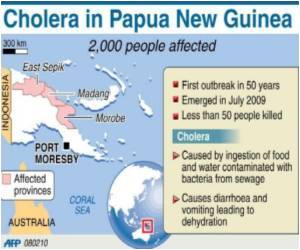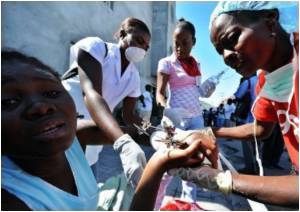
It was the scene of violent clashes earlier between demonstrators angry at the UN mission and how officials have allowed Haiti's spiraling cholera crisis to get out of hand since it broke out a month ago. UN peacekeepers said they fired in self-defense.
"At first (the blue helmets) fired to disperse the crowds, and then later, I have the impression they fired on a man," local official Bimps Noel said.
The young man was shot in the back, the official said, noting that the "UN tanks were hit by stones."
"There was a demonstrator who had a weapon and fired at a soldier, and the soldier returned fire in legitimate self-defense," said MINUSTAH spokesman Vicenzo Pugliese. "The soldier was not injured."
Another Haitian young man was killed by gunfire on a street in Cap-Haitien, amid the clashes, a police source said.
Advertisement
UN forces did not initially indicate whether they had fired live rounds, only acknowledging they had fired tear gas.
Advertisement
"The situation is very difficult, and there is a lot of violence in the city. I am blocked in the city, and I can't get to the hospital," Jasmin said.
Demonstrators set a police station and vehicles inside on fire as they went on the rampage, accusing the government of "leaving the population to die," witnesses told local radio.
Protesters vented particular anger at MINUSTAH. A Nepalese contingent that arrived in the country shortly before the cholera epidemic broke out in mid-October is blamed by many as the source of the outbreak.
The United Nations is probing claims the outbreak emanated from septic tanks at the camp near the central town of Mirebalais, where the Nepalese are based, but the World Health Organization says finding the source is not the first priority.
Protesters reportedly threw stones at the UN peacekeeping unit in the central town of Hinche, less than 50 kilometers (30 miles) from Mirebalais, during a protest involving some 400 people.
The protests showed the cholera was "an issue obviously of national security," said Nigel Fisher, the UN humanitarian coordinator in Haiti.
Less than a month after Haiti's first cholera outbreak in half a century, the number of confirmed number of fatalities stood at 917 and was rising by more than 50 a day. There have been almost 15,000 infections.
Most deaths have been in central and northern Haiti, with the disease not yet widespread in the capital Port-au-Prince, which was badly damaged in a January quake that killed 250,000 people and left over a million homeless.
Officials fear the cholera epidemic could spread exponentially if it infiltrates squalid relocation camps around the capital where hundreds of thousands of earthquake survivors live in cramped and unsanitary conditions.
Some 200 cholera deaths have been reported in the north and 100 in Cap-Haitien, health officials said. Schools in Cap-Haitien are closed as parents are refusing to send children to class, fearing they may get sick.
A top UN official said there are now cholera cases in every one of Haiti's 10 departments and warned that aid agencies were expecting a significant increase in the number of infections.
The burgeoning health crisis comes against the backdrop of great political uncertainty in Haiti, where the first post-quake presidential election is due to be held in less than two weeks.
Whoever wins will have the mammoth task of rebuilding what was already the poorest country in the western hemisphere -- a Caribbean nation facing vast challenges even to get back to where it was before disaster struck.
Problems of corruption, infrastructure and education have now been compounded by the cholera epidemic, which UN health officials are warning has taken root and could see hundreds of thousands more cases in the next few years.
Source-AFP











